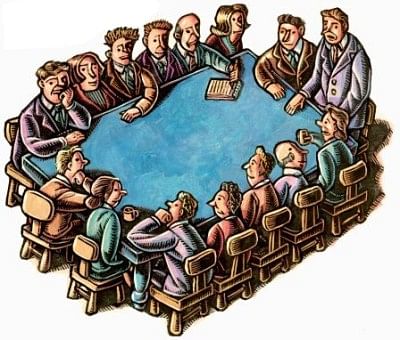Of political leadership, politics, and politicians

Photo: LISA HANEY
The issue of leadership in Bangladesh had never lost its topicality, and as a matter of national concern had never been out of public discourse. Right from the time of our liberation, but more so after the "rebirth" of democracy in the country in 1991, leadership of political parties had been viewed with keen interest by the public, more so when that in certain cases, had been more often thrust on the people rather than acquired by dint of one's merit as a politician. So has been the focus of the public on the quality of politicians. But one would like to emphasise the relevance of pedigree that goes into the making of a good politician and a good leader.
It is regrettable that political demeanour of the top leadership of the major parties has betrayed a predilection for autocratic disposition in treating national as well as party matters. Bad things rub off easily on others, and most regrettably, replication of the behaviour of military autocrats, who wielded power in the country for a good number of years, has characterised the conduct of these leaders. What worries us is that the obnoxious influence has been ubiquitous in our political scene. And this has been eminently exposed in the recent remarks of three one-time important office bearers of the ruling party, related to leadership and quality of politicians in Bangladesh.
While the comments will not endear them to the party, the underlying message should not be lost on the policymakers of the AL. It should neither be mistaken as senseless grumblings of the deprived, because what they have uttered would find resonance in the many that are politically conscious. However, it is not to say that such a trait is unique to one party only, it pervades the minds of leadership of all the major parties in Bangladesh. And this is not restricted either to the top echelons only but refers to leadership up and down the ladder.
Mr. Jalil, the ex-general secretary of the AL, has been highly critical of the way the parliament is being hogged by businessmen (perhaps forgetting that he too is one) causing it to become less and less interested in politics while remaining busy with issues extraneous to the parliament and lawmaking. But such is the character that the parliament has acquired over the last few decades. According to declaration of the candidates 57 percent of the MPs in the 9th Parliament are businessmen. No wonder that the businessmen turned politicians are controlling the parliament, and perhaps too, those MPs, previously more disposed towards politics, have now thought it better and turned businessmen.
Yes, the MPs have been elected by the people, but what other choice did the voters have? Can we expect otherwise when nominations go to those with surplus of money to fill up the party coffer? In most cases it was neither political pedigree nor experience that influenced selection of party candidates. That being said, it must be asserted that there cannot be a bar against anyone taking up politics, provided once elected to public office, his or her actions are not motivated by partisan or group interests, a tall order indeed!
It is hardly a compliment to the party leader when its MPs demand, "that ruling party lawmakers be given full freedom of speech in the parliament, with an assurance that there will be no punitive measure against them for talking against party line. The measure is needed so that the parliament remains effective even if the opposition walks out." And what Mr. Jalil said subsequently during the course of his "meet the press" meeting is very relevant too. He said: "There is now a political leadership crisis in the country as leadership was not created in the last 20 years." And that begs the question.
It is also a damning indictment of the politicians when they are found ingratiating themselves to the intelligence agencies, hoping that a favourable word here and there from these agencies might help put them in some position of importance. And this comes from another senior leader of the same party, Mr. Obaidul Quader, whom nobody can accuse of ignorance. And one cannot fail to notice the remorseful remarks of Mr. Tofael Ahmed that political parties no longer breed leaders because they are often inducted rather then bred from the grassroots level.
In our country leaders seldom retire, nor do they think of creating a worthwhile second and third tier of leadership capable of taking over the mantle once the time arrives. And the "time" is open to speculation. This may perhaps have to do with the leaders' misplaced sense of eternality. What that results in is an unwholesome compound resulting from a mix of arrogance, haughtiness, conceit and ego. The impact of it is not only felt by the party, it also impacts the state of governance in the country. The comments of three senior Awami League leaders expose the lack of participatory leadership that is so very important in politics, both for ownership and implementation of decisions, and must be addressed with due diligence.

 For all latest news, follow The Daily Star's Google News channel.
For all latest news, follow The Daily Star's Google News channel. 



Comments